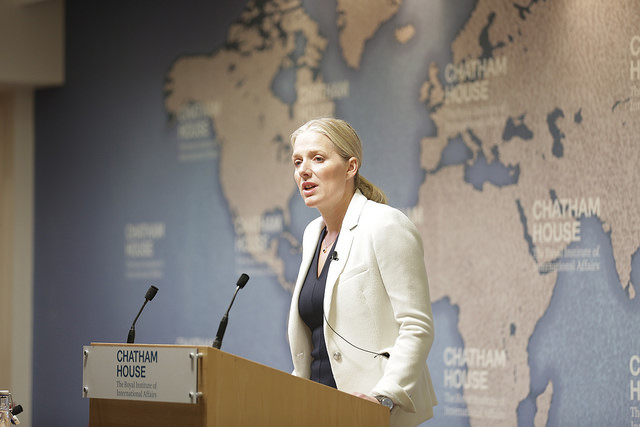
McKenna concerned global politics may keep Paris agreement rules at bay


As the world's governments prepare to meet in Poland to discuss their climate obligations, Canada's environment minister says it will be an uphill battle to curb emissions

PHOTO: Catherine McKenna MP, Minister of Environment and Climate Change, Canada/Chatham House via Flickr
OTTAWA—Canada will be ready to set tougher emissions-cutting plans when the Paris climate-change agreement kicks in by the end of 2020, Environment Minister Catherine McKenna says.
McKenna is heading to Poland next week for the 24th annual United Nations climate-change meeting, where the nations of the world are supposed to decide how each country will be held accountable for its promised cuts to carbon emissions.
A secondary discussion at the meeting is on demands that countries set more ambitious goals. This month’s meeting, known as the Conference of the Parties (or “COP24”), comes two months after climate-change scientists warned the world that without significantly deeper emissions cuts, the planet is on course for irreversible and devastating climate changes.
Canada, that report said in October, needs to cut emissions almost in half if it is to do its part. Canada’s current target is to cut them by about 27 per cent.
McKenna has been reluctant to look at setting tougher goals when the country’s climate change plan is still not strong enough to meet the weaker ones.
But, she acknowledged in an interview, “in 2020 everyone has to come back and be more ambitious,” and she said Canada will.
McKenna said before then, the standards to be set in Poland are needed to help the world take stock of its progress and ensure that everyone is measuring and reporting by universally understood rules. That will give confidence that when a country says its targets are being met, they actually are.
Writing the rule book at the meeting this month is made all the more difficult after the election of several governments that are less enthusiastic about the Paris agreement.
The United States under President Donald Trump is preparing to withdraw at the earliest opportunity—which is in 2020—and the newly elected government in Brazil campaigned on a promise to do the same thing. The Brazilian government also just cancelled its plans to host the annual COP meeting in 2019.
McKenna said in the current global political environment, the Paris accord might never have been reached.
“I think it would be much harder,” she said.
Related: Climate talks shift to nitty gritty details of Paris accord
The Paris agreement, which every country in the world has signed, aims to reduce the amount of greenhouse gases being spewed into the atmosphere enough to keep the increase in average global temperature to no more than 2 C, compared to pre-industrial times, and as close to 1.5 C as possible.
The world’s average temperature has already warmed up at least 1 C compared to the 19th century, and it is continuing to warm by about 0.2 C each decade. At the current rate of emissions, the planet will be 1.5 C warmer by 2052, scientists predict. After that, the impact on human health and ecosystems becomes far more problematic.
Catherine Abreu, the executive director of Climate Action Network Canada, said she is “thrilled” Canada is finally talking about increasing its goals.
“That’s something Canada has really hedged on,” she said.
In preparation for setting new targets, Canada is launching a new climate-change institute. The research and policy body is supposed to open within the next year to advise the government on how its existing policies are working and what else should be done. The government plans to give it $20 million over five years.
Abreu said she wants the institute to be more than just another think-tank; she wants it to be the organization that assesses Canada’s progress in meeting its emissions targets. Thirty-three members of the Climate Action Network wrote to McKenna and Prime Minister Justin Trudeau this week asking them to set emissions targets in binding legislation that would not only compel the government to hit targets, but make backing out more difficult for future governments.